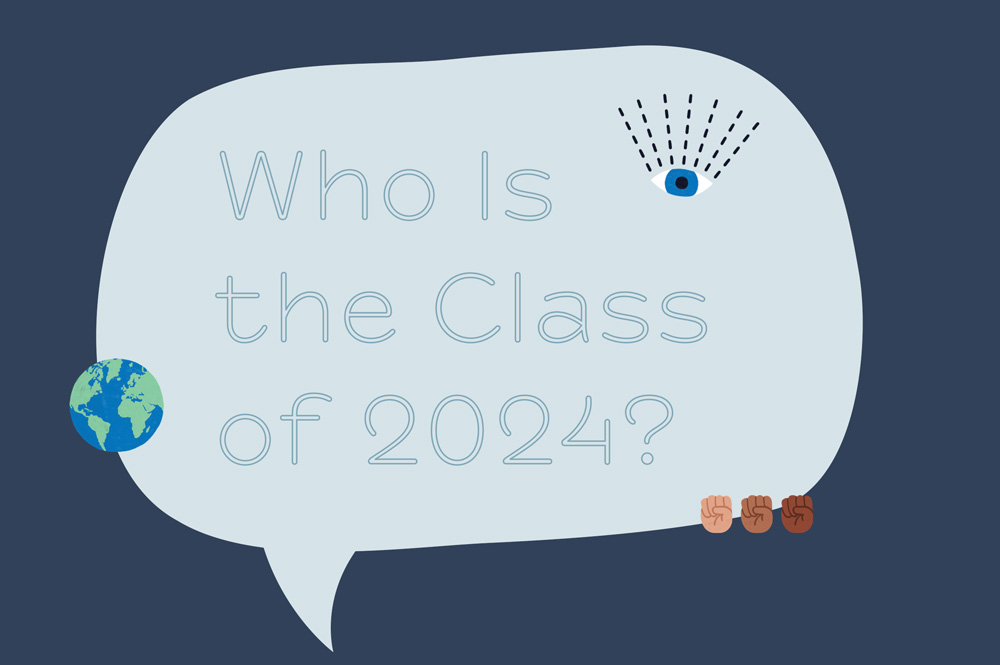
Who Is the Class of 2024?
UConn’s Class of 2024 is like no other. There’s a lot they didn’t get to do (proms, graduations, first-year welcome parties), but let’s take a look at who they are as a group and what, as individuals, they’ve already done and — undaunted — still plan to do.
Illustrations by Katie Carey
This group of 5,750 first-years is more diverse than former classes — 44.7% are nonwhite; about 18% have Hispanic/Latinx backgrounds, and about 7.5% are Black. They are highly accomplished in terms of high school ranking — more than half graduated in the top 10% of their high school classes. And circumstances have forced them to be more flexible and resilient than classes before them — rolling with every change and pandemic possibility thrown at them and then showing up in Storrs, Stamford, Hartford, Avery Point, and Waterbury ready for anything.
Most of all, they seem overwhelmingly grateful to be here, on actual campuses and virtual campuses among friends and friends-to-be — even if the experience looks a bit different than what they pictured a year ago.
Like so many first-years before them, they wrote their admissions essays and imagined those first weeks in college. They pictured crowded classrooms, parties, and games, dorm rooms with roommates, and gift boxes filled with Husky-emblazoned mugs and tees — but certainly not face masks. And while this class is already iconic for reasons they’d rather were not a part of the picture, their essays — submitted shortly before “Covid” and “pandemic” became part of our daily lexicon — are a reminder of that recent social-embracing past and also the not-too-distant future, a future full of those heady college daydreams and all that ambitious career planning coming true. Here are excerpts from just a few of our favorites.
everyone needs saving
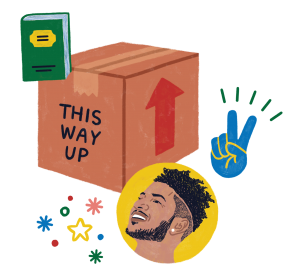
I’m 17 years old and I have moved 17 different times. Along the way, I have learned that everyone has a story and everyone needs saving no matter what background or where they come from. I have learned how to respect people, take responsibility for my actions, and to maintain a decent lifestyle in order to raise a family. I learned that no matter what, I will be faced with various cultures and diversity that has allowed me to see without color. I have learned to respect every race, no matter how different, and use that in my daily life. My future is bright.
—Horacio Honoret, Hackensack, New Jersey, physiology and neurobiology major
on fire
A burning flame stands alone in an ocean of brown and blonde locks. Growing up, I hoped the flame would dim, stand out less in the crowd. Go unnoticed. However, over the years it has burned brighter, both inside and out. My story is not all that original, but still heartfelt. I have always been taunted for my bright red hair. You name it, I’ve been called it, from Carrot Top, Red, Ginger, Leprechaun, even Lucy. I hated all the myths and stereotypes that others associated with my hair color — from being a hothead, flighty, clownish, even soulless. Did you know that in the Middle Ages redheads were assumed to be witches and often put to death! Why could something like hair color generate such fear and attention?
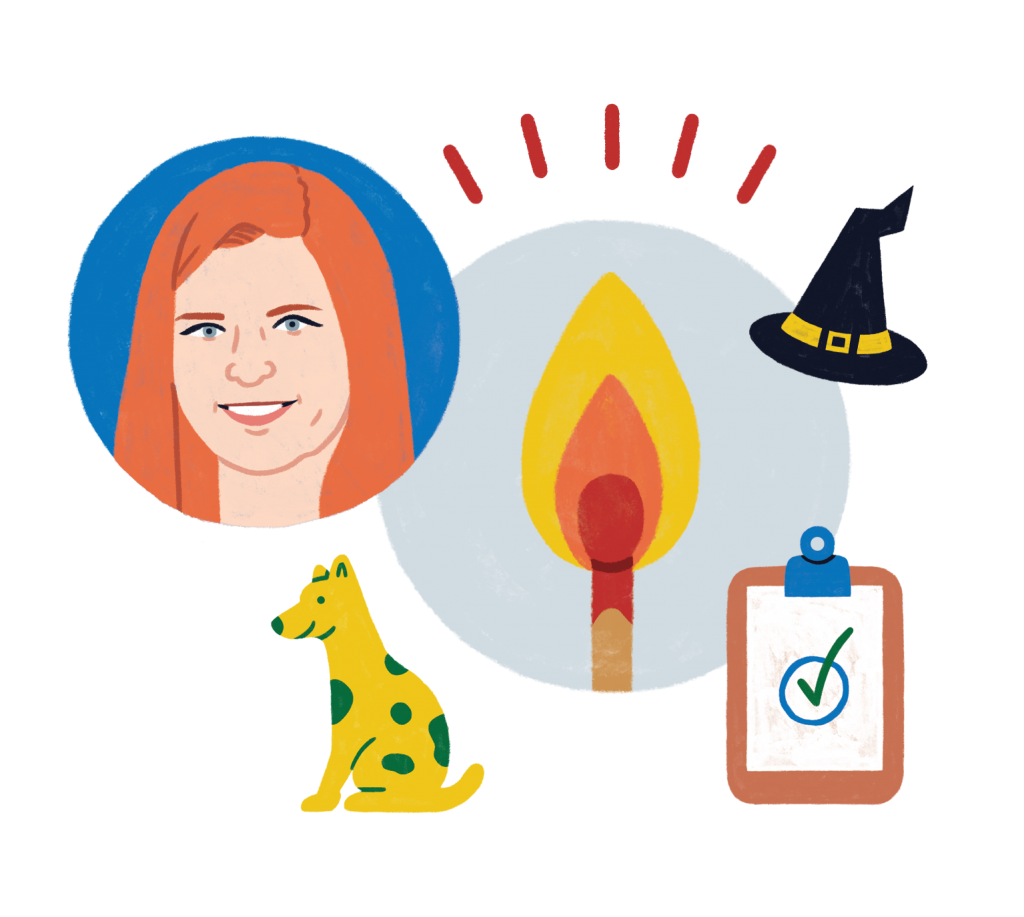
Adults told me how lucky I was to have such beautiful red hair while my peers taunted me endlessly. As you can imagine, this was pretty confusing as a kid and would shake any middle schooler’s confidence. I didn’t want to stand out, I just desperately wanted to blend in. Eventually, I even considered changing my hair color in hopes that the teasing would stop. The more my confidence diminished, the more I dreamed of becoming a brunette. In her senior year, my older sister, also a redhead, dyed her hair black. Like me, she probably just had enough. I imagine she must have wondered what life would be like without the stigma of being a ginger. But she didn’t seem any happier with jet black hair. I realized that changing hair color wasn’t the solution to insecurity. As I watched my sister get numerous re-dyes to return her hair to its natural color, I began to rethink why I let this one thing have so much power over me. Red hair isn’t who I am or what I care about, or value. Why was this such a big deal? It’s only hair. In the worst case I could cut it off and it would grow back. Why was I letting this mop on my head shape who I was, feel insecure, and make me wish I were invisible? Fortunately my sister’s experience helped me figure out that hair color was just one of many of my unique characteristics, like being funny, left-handed, or having blue eyes. The color of my hair didn’t mean I was ditzy like Lucy in “I Love Lucy” (what teenager has ever watched that show anyway?). As a matter of fact, I am one of the smartest kids in my class. I’m the opposite of scatterbrained. Math and science come naturally to me. I’m a very methodical thinker. I wouldn’t have been elected to class office if I was a hothead or disorganized. Animals at the rescue shelter wouldn’t bond with me if I were cold or soulless. With this new self-awareness I decided to face high school with a new attitude. Walking the halls, hearing the same old redhead jokes, I tossed my hair proudly and walked a little taller. Bring it on! I’m stronger because of my mane. I embraced who I am and am comfortable in my own skin. The journey of accepting my appearance has taught me to resist conformity as well as to celebrate other people’s differences. I now love my red hair and would never think about changing who I am. My flame now burns bright enough to light a whole room full of matches just waiting to burn.
—Samantha Ceravolo, Syracuse, New York, biological sciences major
“Bring it on! I’m stronger because of my mane.”
how I learned what a congressman was (or: why I want to be an astrophysicist)
At 4 years old, I firmly believed that aliens had been to Earth. I have profound memories of sitting in my mom’s 2005 blue Chrysler Town & Country. The plush gray seats were juxtaposed by the dried-up lollipops on the carpeted floor. The seat belts, and their frayed ends, kept me and my booster seat from sliding around the car (or flying out of it in the event of an accident). In terms of additional luxuries, we were blessed with the latest and greatest of technologies: an FM radio, which allowed for 6 presets and a 6-CD switcher. Quite often, the radio would be tuned to a classic rock station. It was the only genre allowed. Interestingly enough, the speakers in the third row (or as I liked to call it, the “way-back”) of the minivan were better than those of the second. And when my parents would think they were punishing me to sit in the third row, I was living life to its fullest. In a strange turn of events one night, my parents banished both me and my older sister to the third row. This aggravated me, because now I could no longer spread my feet across the palatial bench that was the way-back. On the radio, a classic.
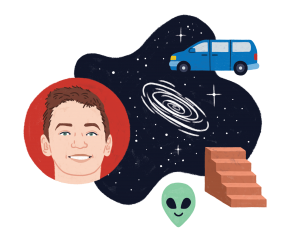
None other than “Stairway to Heaven” by Led Zeppelin. The intricate serenade of the song was accompanied by the concerned voice of my mother. “Dear god, what is that?” she questioned, barreling down I-95 at 70 mph, looking in the rearview mirror. Simultaneously, my sister and I whipped our heads to view the mysterious object. The object undulated across the night sky while displaying an unreadable message along its bottom. As 4- and 6-year-olds do, my sister and I start crying, firmly believing that this object was a flying saucer. Naturally, we begin screaming, “Oh my god, the aliens are taking over!” my sister cried. “WAAAAAAAA!” I concurred. My mother, visibly confused, reassured us that this was not a UFO, but it was, in fact, a campaign tactic by a local congressman. Me, not knowing what a congressman was, became more terrified. My arms had begun to flail. I could not ignore the fact that alien invasion was imminent. Minutes went by. My arms? Still flailing. My eyes? Still sweating. Me? Still petrified. My sister? The same. Even though I remember the sheer terror I felt at this moment, I wish I could recapture my childhood ability to imagine. Imagination, as indistinct as it may make one’s adulthood seem, is an essential part of growing up and setting us apart. It’s quite easy to forget when we get so caught up in the hustle of everyday life. But I want to take a step back. I want to imagine what life outside of our everyday is like. I desperately want to learn more about not only the world around me but everything that surrounds it. In my opinion, our ability to imagine is driven by our desire to know more about everything. And according to a Google search and space.com, we only know about 4% of the universe. The other 96%? That’s up to your imagination. Or astrophysicists.
—Joshua Ellenberg, Flemington, New Jersey, exploratory major
“...we only know about 4% of the universe. The other 96%? That’s up to your imagination. Or astrophysicists.”
surviving
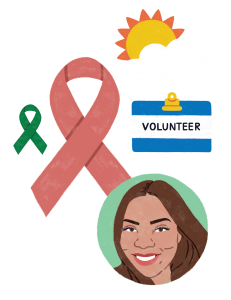
It was a chilly, sunny October morning, and I was volunteering at the Breast Cancer Walk in my community. As the momentum of people started to grow, the cold that was biting my fingertips started to dwindle, and I was warmed by the enthusiasm from people who I had never seen before. "Survivor" is what was written on most of their shirts. Witnessing such an incredible sight, watching these dazzling people celebrate their lives, made me come to a realization. Being a survivor is not just about the story you have to tell, but it is also about the person you have become because of it. Now I am capable of embracing the struggle of my own mental battles and preparing myself to surmount them. If these beautiful people could survive and whistle to the beat of a morning tune, so can I.
—Analise Sanchez, Monroe, New York, mathematics major
judgment is a learned behavior
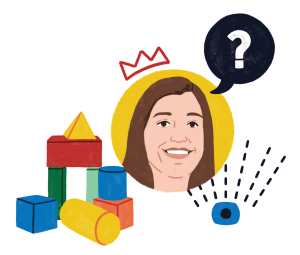
For two years I have worked for my town recreation center through their childcare programs. For two years I have chased laughing children, listened to their elaborate stories, and helped them create new friendships. This past summer, I was asked to work specifically with Jack, whose disability prevented him from the simplest of actions, such as placing a goldfish cracker in his mouth or standing up to use the bathroom. While I pride myself on my maturity and acceptance of others, I could learn a few things from the children I work with. From Jack I’ve learned to be more vocal, to ignore other people’s opinions. He is never slowed down by his disability. Perhaps it’s simply the naiveness of childhood, but he is unfazed by the opinions of others. From Jack’s peers, I’ve learned not to make assumptions. It is human nature to judge others, but that trait is less prominent with children. The judgment of others is instilled in us at a young age; it is not a genetic trait. Since I began to work with Jack, I have found myself being less judgmental of those around me. I am less afraid to be curious and ask questions, even if those questions aren’t easy to address. Adults often stray away from difficult topics because they are afraid of confrontation or uncomfortable conversations. We should take notes from the children around us and learn to embrace our curiosity.
—Sydney Fournier, South Windsor, Connecticut, digital media and design major
more near-death experiences than a mountain climber
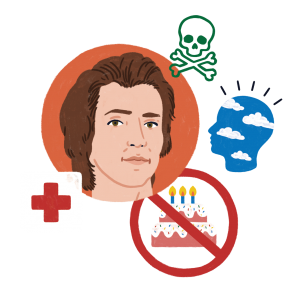
I was born with a severe allergy to milk and dairy. It was discovered after I drank baby formula and went into anaphylactic shock. My parents rushed me to the hospital, where they received the diagnosis. It consumed my life. Double- and triple-checking ingredient labels. Refusing birthday cake, explaining exactly what would happen if I did eat it. Seeing the shock on people’s faces as they wonder how on earth a Boston cream donut could have such a fatal effect. Then hearing people’s expressions of sympathy. How they cannot imagine going through each day having to constantly be alert for the risk of death by cookies, crackers, or candy. There are certainly drawbacks to living with an allergy, however, it is not all bad. One small enjoyment is revealing that I have had more near-death experiences than the most adventurous of mountain climbers. On a more serious note, living with an allergy has taught me how to be prepared and how to handle myself in stressful situations. When I experience an allergy attack, the most common response from the people around me is panic, while mine is one of calm. I resolve the situation as quickly and efficiently as possible in order to prevent my untimely demise.
—Dennis Dowding, Ridgefield, Connecticut, design tech and theater major
“Seeing the shock on people’s faces as they wonder how on earth a Boston cream donut could have such a fatal effect.”
inclusion = success
In school, I often encountered various racial slurs, but these experiences made me an advocate for inclusion and acceptance. When my classmates are left out during gym classes, I invite them to join my team. The beauty of leadership does not only rest on promoting and embracing diversity, but also on encompassing the ability to respect others through inclusion and creation of a positive climate.
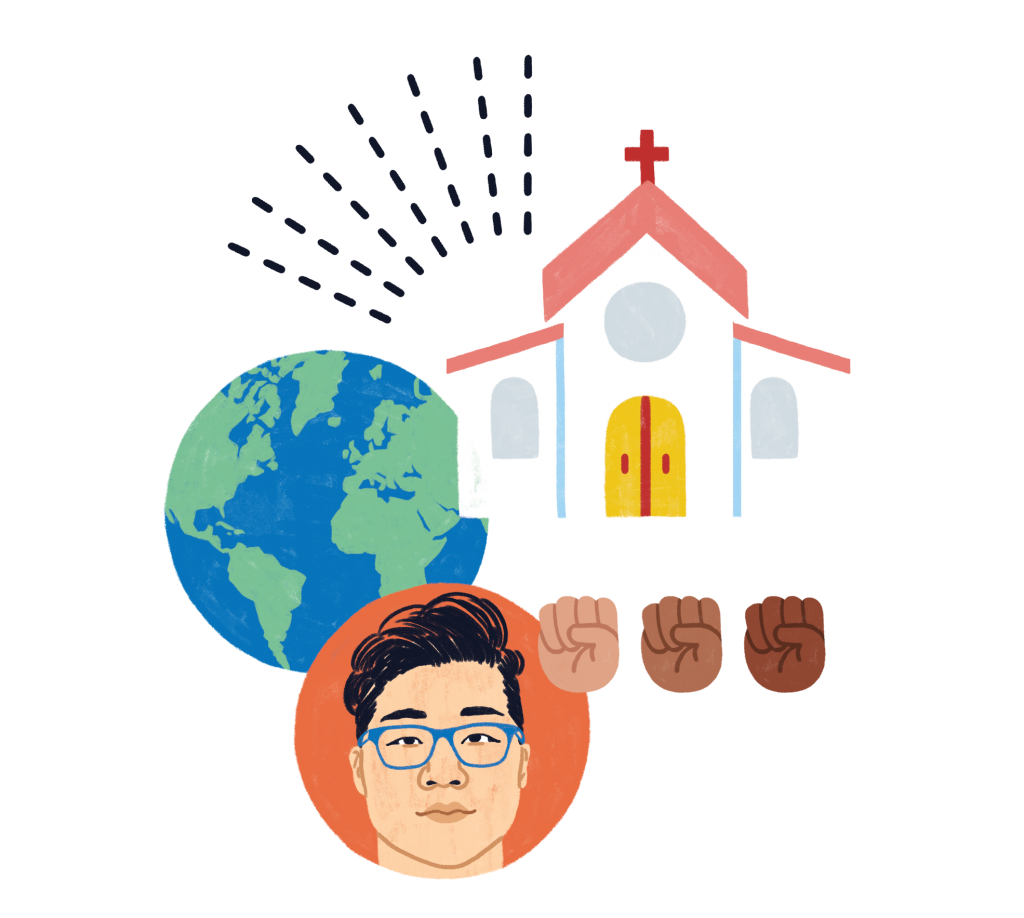
In my orthodox Jewish neighborhood, I saw myself reflecting on my own religious journey as I saw my neighbors walk to temples and dedicate the Sabbath to rest and worship. Although I consider myself a devout Christian, the Jewish community’s extreme dedication to their faith and obedience to religious observances humbles and realigns my priorities. Through them, I learned that there is always something to be learned from those who are completely different from me in every aspect of race, ethnicity, and religion. Diversity is an essential component of success, and this is especially true in the United States that boasts multiculturalism and diversity of background, thoughts, and ideas.
—Eric Hwang, Lawrence, New York, political science major
sports saved my life
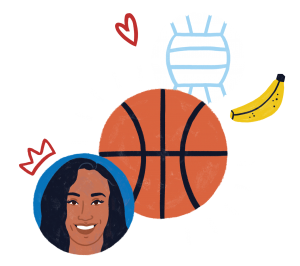
I am not being dramatic when I say sports has saved my life and is a part of my family. It’s my third parent, reminding me to go to bed on time, to be well rested for game day, nagging me to eat the proper food to fuel my body for the physical demands, encouraging me to set a good example for the younger girls looking up to me. It’s my third sibling, annoying me when all I want to do is sleep, cheering me on when I have a great game, arguing with me when I have a bad one. It’s the best friend I look forward to seeing every day at school, depending on it to always have my back. It’s my boyfriend, making me
nervous when the stakes are high, planning my future with it, wanting to impress it.
—Taylor Pannell, Middletown, New York, animal science major
the choice
More than 18 years ago, a young man made a decision that ultimately made my existence possible. To him, the decision to donate his sperm may have seemed like an insignificant event in his life, but without it I would not be here today. I wonder if I look like him or if we have similar personalities. I will never know unless I choose to meet him. At age 18, I will have that choice.
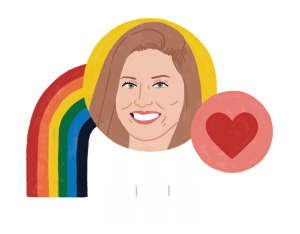
I do not believe that blood creates a family — love does. I have received unconditional love from my moms, and I credit them with the caring, determined, and hardworking person I have become. My parents have taught me to be strong and always stand up for what I believe in. I have grown up with the influence of two amazing women, and I do not feel as if I am missing a part of my family. I feel more connected to my moms than I ever will to my donor. He has not been present for any of my accomplishments and he has not been there to comfort me in times of need. My donor helped give me life, but he did not shape me into the person I am today. With that being said, I have decided not to meet him, because he will forever feel like a stranger and not a part of my family.
—Erin Carney, Hudson, New Hampshire, political science major
the future is now
As I swerve down bustling sidewalks and navigate barely distinguishable trails through the woods, I am left out in the world with nothing but my own thoughts to distract myself from the aching in my legs that doubles in intensity every time my foot strikes the ground. But what does one think about when given an hour of open road and near complete freedom of the mind? As my brain searches for any interesting series of electrical signals that will help me pass the time, I begin to wonder, "What is time anyway?"
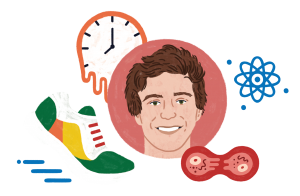
Time is the fundamental element in the sport of running and absolutely crucial in our daily lives, yet it is something so few of us really understand. Relativistic time describes a fourth dimension of the universe, but one through which we are unwillingly pulled. The past, present, and future exist simultaneously, although we can only observe one. They exist just as the people in the next room exist when we cannot see them. All the numbers that will impact aspects of my life — from when I can vote or drive a car to whether or not colleges will recruit me for cross country to when I can leave Spanish class and go to physics — are no more than artificial constructs our brains have created to help us perceive the universe. And according to my brain, I am only five minutes into my hour-long run. When I run, I travel through all four dimensions of space, and that unfortunately includes the vertical one. The burning in my quads as I struggle my way up a seemingly endless hill brings me to question how this hill came to be. What movements of tectonic plates, vast glaciers, powers of erosion, or determination of man have joined forces to create this evil thing that now causes me so much pain? I comfort myself with the knowledge that, as I slowly rip apart the actin and myosin fibers in my muscles, I am actually benefiting myself. To make myself keep going I must remind myself that, as I sit at home later, binge watching “The Big Bang Theory,” the satellite cells in my muscles will not only repair the muscles but make them stronger than they were before. But if Einstein was correct, even before I begin my ascent, I have already finished the run. And in a different time that also exists right now, the hill does not even exist yet. Looking for a less confusing way to distract myself, I listen to the songs of a bird and marvel at the millions of years of evolution that have finely tuned the complex DNA sequences giving the bird its ability to sing so beautifully. I run by the World War II Veterans Memorial and think of what could have been done to avoid such atrocities. I think of history’s impact on us all and wonder how the world would change had different decisions been made throughout history. I wonder how my life would be different or whether I would even be here at all had any part of history gone differently. Eventually my watch beeps to alert me I have run eight miles, and I realize I am only a block away from home. I have always been fascinated by the intricate workings of the world around me. As I climb the four steps up to my front door, I try to be observant and learn about how those stairs were assembled. Then I go inside and check the weather forecast to see when I will get to run again tomorrow and escape back into my thoughts. I want to continue learning in the hopes that one day, just maybe, I will learn something that no one has before. That future depends on the decision you make. But if the future already exists, can it still be changed?
—Cody Ottinger, Hopkinton, Massachusetts, engineering majo
“The past, present, and future exist simultaneously, although we can only observe one.”

Leave a Reply